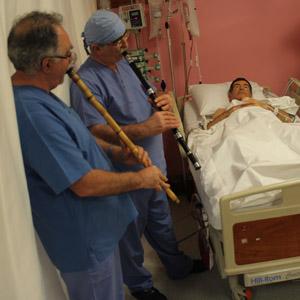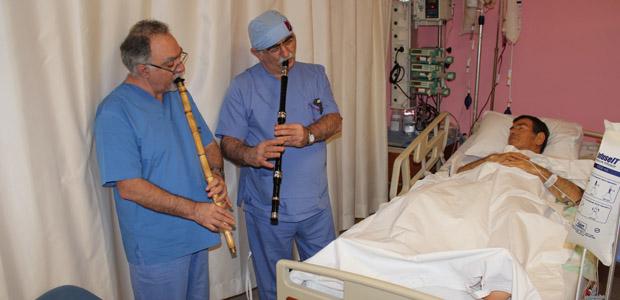In Turkey, Sufi music is used to decrease patient stress
Erol Can (left), an anesthesiologist, and Bingür Sönmez, a cardiac surgeon play for a patient. (Photo by Matthew Brunwasser.)
The intensive care unit of Istanbul Memorial Hospital looks like any modern hospital anywhere. But it definitely doesn’t sound like one.
Dr. Bingür Sönmez, a cardiac surgeon for more than 30 years, plays traditional Sufi songs on the ney flute for his patients.
"What we are doing in intensive care, we are playing Sufi music to our patients to calm down, to make them feel much better,” he said.
Sufism is a mystic branch of Islam whose traditional music is popular among Turks. Sönmez said five centuries ago when Europeans were burning people alive for having mental illnesses, healers in the Ottoman Empire had a different approach.
“In this country, in Ottoman Empire times, we used to treat psychiatric patients with music in hospitals, in local hospitals,” Sönmez said. “So what we are doing is the same.”
After a short performance for one patient, anesthesiologist Erol Can said the patient's heart rate decreased by 15 percent. According to Can, musical therapy has scientific backing. He says the hospital conducted a study of 22 patients and measured their stress levels on a scale of one to 10. Their stress went down from an average of seven to three after a 20-minute musical performance.
 “We recorded heart rate, systolic and diastolic blood pressure, respiratory rate and oxygen delivery, the oxygen saturation of the blood. Every parameter was better after this 20 minutes,” Can said.
“We recorded heart rate, systolic and diastolic blood pressure, respiratory rate and oxygen delivery, the oxygen saturation of the blood. Every parameter was better after this 20 minutes,” Can said.
The impact of music on anxiety is well documented by doctors and researchers. Neuroscientist Damir Janigro at Cleveland Clinic conducted a study demonstrating the calming effects of melodic music on patients undergoing brain surgery.
"With the right music," Janigro said, "patients can be more relaxed in the operating room. And that relaxation may mean not only that procedures involve less medication — to control blood pressure, which increases with stress — but perhaps that patients have quicker recovery times and shorter hospital stays."
But while Janigro uses an iPod to provide music to patients in his study, Sönmez and Can play live music to mimic traditional therapy practices.
The doctors use different makams, classical Turkish melodies, to treat specific conditions.
“That makam makes you sleepy, it’s a real meditation music,” Sönmez said. “So it's good to listen to when you go to bed. If you listen to this makam when you are waking up in the morning, you won’t be able to get out of the bed.”
There are makams that can help with other conditions as well. One supposedly increases your appetite, another can help you lose weight. The music has significant health results, the doctors say. But while they sing the praises of music therapy, they stress it’s a compliment — not a replacement — for conventional medicine.
